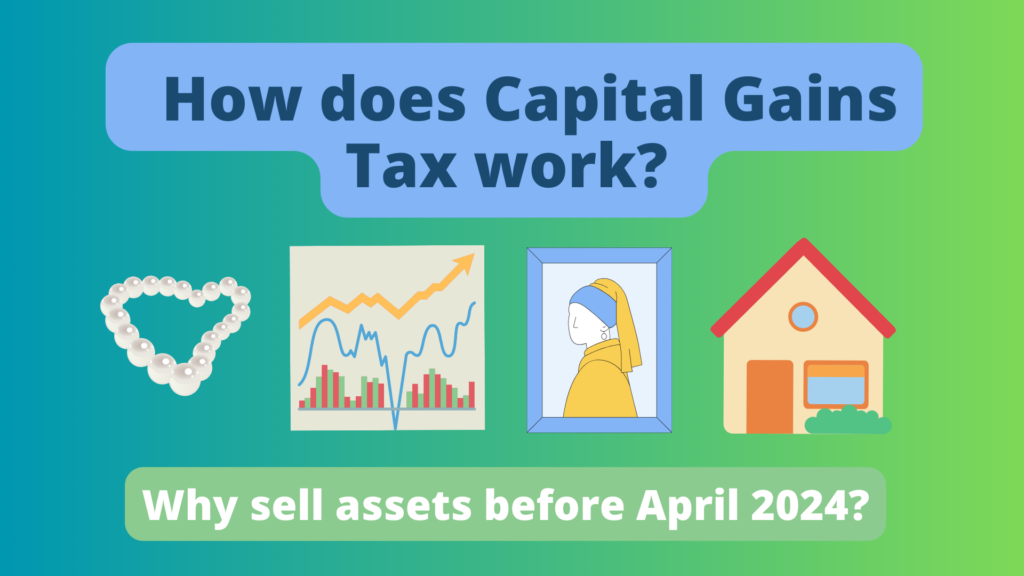When you sell an asset, such as property, stocks or valuable possessions and you make a profit, Capital Gains Tax (CGT) may apply. In this blog, we look at what Capital Gains Tax is, who needs to pay it and how you can navigate your tax obligations.

What is Capital Gains Tax?
Capital Gains Tax is a tax on the money you make when selling certain assets. These include:
- Property: Selling your main residence is usually exempt from Capital Gains Tax, but a second home or a buy-to-let property will tend to qualify for the tax.
- Shares: You might pay CGT when selling shares in a company – both those listed on the stock exchange and unlisted shares. But this does not apply if the shares are part of an Individual Savings Account (ISA) or Personal Equity Plan (PEPs).
- Personal Possessions: Valuable items like art, antiques and jewelry that have a value exceeding £6,000 may be eligible for CGT. Eligible items must have a long lifespan of more than 50 years – so selling cars or watches won’t expose you to tax.
- Business Assets: If you’re a business owner, Capital Gains Tax may apply when you sell or dispose of business assets. Typical assets are property, land, machinery and registered trade marks.
The tax is calculated based on the difference between the asset’s selling price or market value and its original purchase price. This is known as the ‘capital gain.’
Importantly, Capital Gains Tax is only payable on the gain, not the entire sale proceeds.
Who needs to pay Capital Gains Tax?
UK residents each have an annual tax-free allowance. You only need to pay CGT on total gains above this amount. In the 2023/2024 tax year, the Capital Gains Tax allowance is £6,000.
If you are married or in a civil partnership or own assets with another person, you can combine your exemptions to potentially double the tax-free gains.
Note that CGT allowances have decreased from £12,300 in 2022/23 to £6,000 this year, and are due to halve again next year (April 2024) to £3,000.
When is Capital Gains Tax not applicable?
You don’t need to pay CGT in certain situations, such as:
- Making a gift of an asset to your spouse or civil partner
- Giving an asset to charity
- If you win a sum of money in a lottery or competition
- If you make gains from ISAs or PEPs, UK government gilts or Premium Bonds.
What is Capital Gains Tax charged at?
The rate of tax you pay depends on your total taxable income for the tax year, as it is linked to your tax band.
As of 2023/2024, the CGT rate for higher or additional rate taxpayers is 28% for gains from residential property and 20% on other assets.
For a basic rate taxpayer, CGT on any gains within your basic rate Income Tax band is 18% for residential property and 10% on other assets.
How can I reduce my Capital Gains Tax?
There are a few options that may reduce the tax due on gains from disposing of your assets:
- Careful timing. Deciding when to sell or give away assets may be important, especially with the allowance set to reduce further next year.
- Using schemes and wrappers. Investment schemesand tax relief routes may help – seek advice on which might apply to you.
- Make use of any losses. If you make a loss on any investment, you may be able to offset this against your gains. You can also carry forward capital losses to future tax years.
- Tax free transfers. You can transfer assets to a spouse or civil partner, which can be helpful in sharing the gain, especially if your partner sits within a lower tax bracket.
- Manage your taxable income. Because the rate of CGT you pay links to your income tax band,it can help to reduce your income. Common ways to do this are to increase pension contributions or make charitable donations.
Advice on managing Capital Gains Tax
If you need to pay CGT, make sure you maintain accurate records of all transactions, including original purchase costs, expenses and the selling price. Good records will help you calculate the correct tax liability.
Capital Gains Tax can be complicated, especially if you’re dealing with multiple assets. We’ll be pleased to advise you and help you keep CGT to a minimum. Get in touch to find out more.

